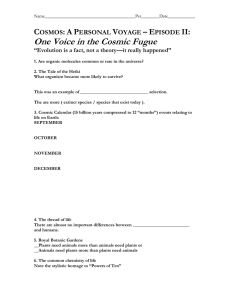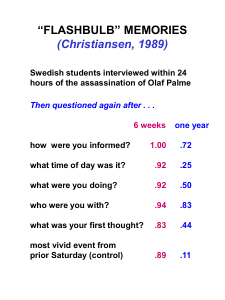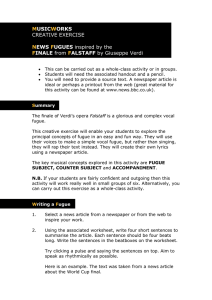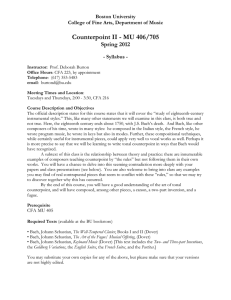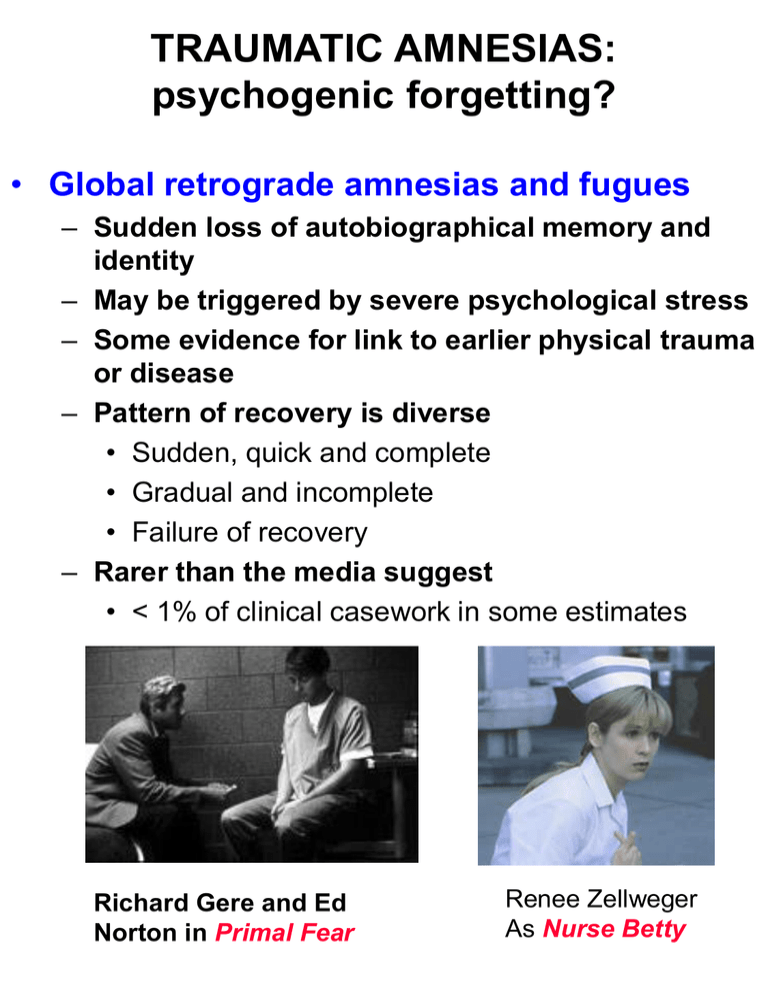
TRAUMATIC AMNESIAS:
psychogenic forgetting?
• Global retrograde amnesias and fugues
– Sudden loss of autobiographical memory and
identity
– May be triggered by severe psychological stress
– Some evidence for link to earlier physical trauma
or disease
– Pattern of recovery is diverse
• Sudden, quick and complete
• Gradual and incomplete
• Failure of recovery
– Rarer than the media suggest
• < 1% of clinical casework in some estimates
Richard Gere and Ed
Norton in Primal Fear
Renee Zellweger
As Nurse Betty
"A fugue is a combination of amnesia and
physical fright. The individual flees from
his customary surroundings toward the
assumptions of a new identity.“
American Psychiatric Association
1994 Diagnostic and Statistical
Manual of Mental Disorders, Fourth Edition
• Recovery from Fugue states: a
sampler
– Libby Morris: lost from a shopping mall
• Rapid, almost complete recovery
• Amnesia for fugue period
– Ricky Stephenson: AWOL
• Unresolved after two years
• Relearning his past
– Jody Roberts: You’re a
thousand miles away
• Unresolved after 12 years
• New, stable identity established
– James Smith: Rip van
Winkle awakes
• Fugue ends after 25 years
• “gap” before recovery
• Amnesia for fugue period
• Dissociative Identity Disorder (aka
Multiple Personality Disorder): A
capsule history
– Rash of cases in late 19th century
• Seen as symptom of “hysteria”
– Extremely rare until 1980’s
• Pre 1970’s < 100; ’85 – ’89, c. 40,000
• Media and professional attention
– DID and the recovered memory
movement
• Often linked to recovered memories of
abuse, other more bizarre experiences
• Often evolves during aggressive therapy
– 1990’s: backlash of skepticism
Recanters in court
CHARACTERISTICS OF DID
• The person
– Associated with early, chronic abuse or
trauma (est. 50-70% sexual or physical
abuse incidence)
– And with “a trail of psychopathology”
– Tend to be highly hypnotizable
• Memory aspects
– Autobiographical dissociation may be
complete, or “leaky”
– Some evidence for implicit memory
“across identities”
• The outlook
– May resolve with therapy or time
– Difficult to separate “genuine” cases
from role-playing
– Relation to everyday “dissociations” in
mood and memory
– Relation to fugues?
DID: an fMRI study
(Tsai, et al. 1999)
• 47-yr old woman
– Severe childhood abuse
– DID and PTSD diagnosis; long-term
therapy
– Hippocampal volume reduced
1.1 cm3 vs. 2.6 +/-.02 cm3
– Normal-range score (106) on WMS
• Cued switch to/from:
– Alter personality (“Guardian” 8 yr old)
– Irrelevant personality (“Player” 8 yr old)
• Avg. 30 seconds to switch
– fMRI during switch, maintenance
– Right hippocampus:
• Inhibition during switch to alter
• Activation during switch from alter
• No changes during “control” switches



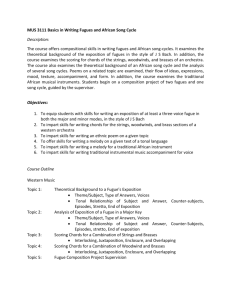
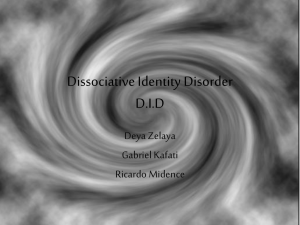
![QUESTION 6: Beatles [10]](http://s3.studylib.net/store/data/009758860_1-f81f55c5d34e2cd1e7ecfb9d98335c8f-300x300.png)
